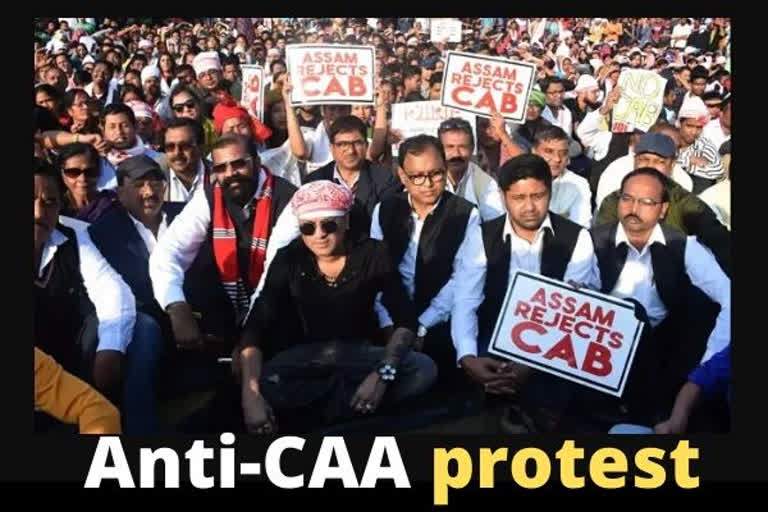New Delhi:The fiery and violent disturbance that exploded in the Brahmaputra valley—the heartland of the Assamese—on December 9 and 10, against the enactment of the amendment to the Citizenship Amendment Act (CAA), has now spread to new areas across the country including the national capital.
But in Assam, what caught everyone by surprise was the intensity of anger and its spread to areas where it was predicted will be muted. Disturbing visuals of pitched battles in the streets between protestors and security forces and never-ending processions by men and women, the elderly and the children, in open defiance of curfew orders, was an indication of a pent-up anger.
In fact, intelligence sources that ETV Bharat spoke to even before the CAA was enacted indicated apprehension of wide-scale disturbance in Assam, yet there were not too many policemen to be seen on the streets, indicating a lack of preparedness.
The absence or paucity of security forces to implement the curfew was quite evident in Assam as breaking curfew orders became the rule rather than the exception. The anger only multiplied due to the banning of Internet and mobile data services by a government order in apprehension of protests and violence.
While the government may have closed down the Internet to quell rumours and spread of incendiary propaganda framed with ill intent, there is now a big question on the efficacy of this latest tool of Internet shutdowns being increasingly used by the authorities.
An Assamese joke doing the rounds took a jibe at the government for banning the internet saying “even the few kids playing PUBG will come out to the streets to protest.” PUBG is a Korean online game usually played on mobile phones that keeps youngsters riveted to their phones.
A senior Assam police official told ETV-Bharat that operation of the Internet and a functional social media may have been an effective ‘safety valve’ to the outburst of pent-up feelings. “Possibly the outbursts would have been limited to furious comments on Facebook and WhatsApp. Finding no way to vent out their feelings, many youngsters took to the streets. It was the boomerang effect,” the official said.
While the developments may compel the government to take a new hard look at Internet ‘black-outs’, it is being increasingly used globally, mainly with the intent to stem the exchange of information online especially during situations that challenge the law and order.
Usually in India, the government orders the Telecom Service Providers (TSPs) to ‘black out’ the Internet services across certain geographies. Internet services are blocked under three extant laws: Section 144 of the Criminal Procedure Code, Section 5(2) of the Indian Telegraph Act, and the Temporary Suspension of Telecom Services (Public Emergency and Public Safety) Rules, 2017.
According to the 2018 report “Living in Digital Darkness” brought out by the Software Freedom Law Centre, besides India—which easily leads the list in ordering Internet ‘black-outs’—more than 30 countries, including among others, Pakistan, Bangladesh, Myanmar, Egypt, Congo, Syria, Sudan, Burundi, Iraq, and Venezuela—frequently issue such bans.
According to a study, in a seven-year period from January 2012 to January 2019, there were 278 Internet ‘black-outs’ ordered across 19 states in India, of which 160 were ‘preventive’ measures taken in anticipation of law and order breakdowns, and 118 shutdowns that were ‘reactive’—in order to control law and order situations.
The clampdown was mainly aimed at mobile Internet services with 224 of the 278 reported to be ordered just for mobile Internet data with the rest being meant for either both mobiles and fixed lines phones or just for fixed lines.
The longest Internet shutdown in India till date is an ongoing one in Kashmir (135 days till December 16, 2019) ordered after Article 370 of the Indian Constitution was abrogated by Parliament. Earlier, the longest 'black-out' spell was for 133 days from July 8, 2016 to November 19, 2016 in Jammu and Kashmir during the agitation that sparked off after the gunning down of militant poster-boy Burhan Wani. India is believed to have about 630 million Internet subscribers, of which about 97 per cent million are mobile Internet users.
ALSO READ:India protests CAA: Five anti-CAA protesters killed, 28 injured since Dec 11
